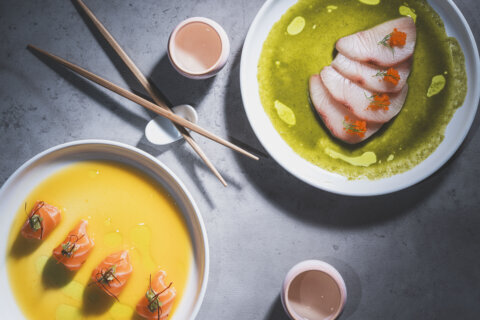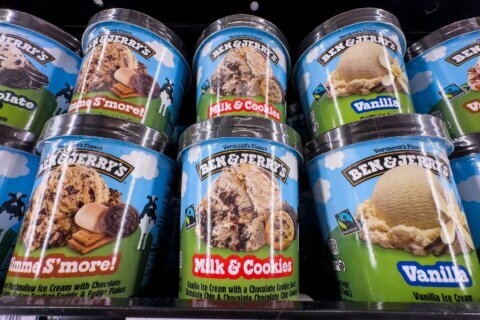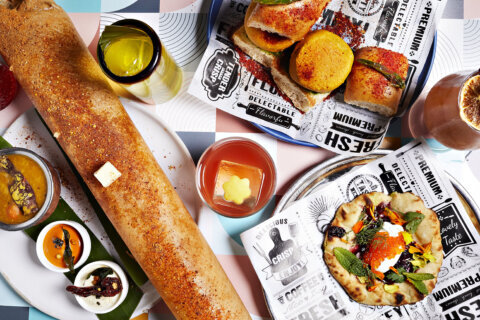Restaurants across the nation are escalating their efforts to maintain a lighter or zero carbon footprint. Measures, such as composting, moving toward reusable containers and focusing on partnering with local farms and producers, are becoming much more typical in kitchens around the nation.
These kinds of actions are coveted by the everyday customer, with nearly 75% of U.S. adults saying they are more likely visit a restaurant that employs sustainable and environmentally friendly business practices, according to a 2023 report by the National Restaurant Association’s State of the Industry.
But there are food and beverage businesses in the D.C. region that are raising the eco-bar, proving this is only the beginning.
For Earth Day in 2024, WTOP’s John Domen asked Oyster Oyster Chef Rob Rubba what sustainability tips he had to offer. For home cooks, he said at the time, it’s important to get involved in a composting program, avoid plastic wraps and prepackaged foods and also veer away from buying more than you need in order to lessen food waste.
But Rubba said he incorporates several other innovative, sustainable-forward procedures in his restaurant that set him apart from many other chefs. This is true to the degree that Rubba is the first and currently only D.C.-proper chef in the Michelin Guide to have a Green Star, which is a rating given to restaurants for their sustainability efforts.
The second and only other restaurant in D.C.’s Michelin Guide to have a Green Star is The Inn at Little Washington in Washington, Virginia.
Rubba told WTOP that gaining the Michelin Green Star was an “incredible honor,” but he said they’re “never accolade-driven.” Instead, what motivates his plant-forward restaurant is a “zero waste commitment.”
Rubba’s list of eco-friendly practices at Oyster Oyster is both lengthy and ambitious. One notable highlight is that 90% of the cooking equipment in the kitchen uses induction or electricity rather than gas, though the goal is to eventually convert to 100% “within the next few years.”
The businesses that Oyster Oyster works with are also operated with sustainability in mind, including Deep Roots Milling, the only water-powered mill in Virginia. The farmers Rubba works with use collapsible containers that are reused with each trip.
At his restaurant, leftover ingredients are never ignored. For example, carrot skins may be turned into a beverage pairing, or added into a sauce or dried in order to be incorporated into a granola. Guests may also notice votive candles at their tables made from recycled cooking oil, local beeswax and empty oyster shells. Excess bread may be turned into a miso paste.
Even leftover water in customers’ cups may be reused to water the plants at the restaurant.
“We’re always thinking about an ingredient as ‘never waste, never scrap,’” Rubba said. “It’s just an upcycled ingredient.”
Another method the business uses is a glass crusher to turn empty wine bottles into dinnerware for the restaurant, thanks to a partnership with Maryland-based Material Things Studio. The materials used in the chef’s coats are also considered, with only cotton and hemp used, and they’re washed with noncorrosive materials.
For customers who want a take-home memento, consider the recycled paper menu, with flower seeds ingrained inside each one.
“Nothing really needs to go in the trash,” Rubba said. “We don’t have a traditional trash can at the restaurant.”
‘Very rewarding’
Rubba isn’t alone in reshaping the food and beverage industry to be more eco-friendly. At the French “neo bistro” known as Lutèce, Chef de Cuisine Bruno Enciso told WTOP reducing food waste is an essential and everyday mission at the Georgetown eatery.
One of the ways in which the team at Lutèce showcases leftover ingredients is through their nonalcoholic kombucha, which is made in-house using food scraps. The restaurant’s drink is made with seasonal ingredients, such as rhubarb, and tastes fresher, brighter, fruitier and less acidic than similar kinds found in supermarket aisles.
“We definitely want to reduce waste as much as possible where we can see fit,” Enciso said.
Since 2020, the restaurant has been serving different types of kombucha on its menu, such as a Tepache-inspired version made with fermented pineapple peels, sugar and warm spices, such as clove, cinnamon and star anise.
Other “no-brainer” sustainable methods, as described by Enciso, include reducing food waste by making stock out of leftover bones or vegetable scraps, fermenting the ends of asparagus to create a concentrated flavor booster for sauces, reusing excess vegetable juices for cocktails and dehydrating the tops of ramps to later be blitzed into a powder for seasoning.
Many of the leftover ingredients are spur of the moment ideas, but also in constant consideration, especially if these products can be reused to add unexpected layers of flavor to a dish.
“We’re moving with whatever inspires us,” Enciso said.
Being environmentally friendly and sustainably-minded could seem daunting to some who may not be familiar with the practices — as Rubba put it, it’s “this really vague term, and it’s a big umbrella.”
“If you just start with one thing and then keep progressing and trying to change a little bit in your life, day in, day out, the results in the end are going to be very rewarding,” Rubba said.
Get breaking news and daily headlines delivered to your email inbox by signing up here.
© 2025 WTOP. All Rights Reserved. This website is not intended for users located within the European Economic Area.







